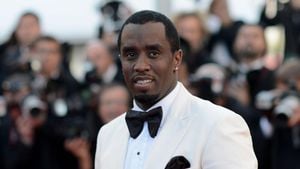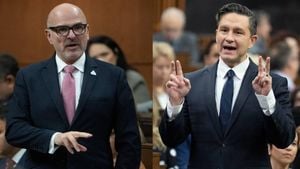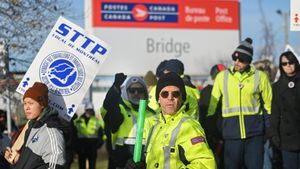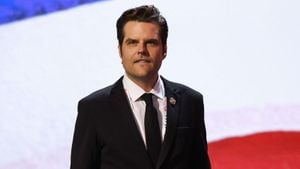The annual United Nations climate talks, known as COP29, have kicked off amid significant tension and uncertainty. This year's conference, taking place in Baku, Azerbaijan, is facing numerous challenges, particularly due to the recent U.S. elections and the return of Donald Trump, whose climate skepticism raises alarms among climate advocates. The stakes are high as negotiators from around 200 countries grapple with how to address the ever-growing climate crisis and set new financial commitments for climate adaptation and mitigation, especially for developing nations bearing the brunt of climate change impacts.
Azerbaijan, the host nation, is heavily reliant on fossil fuels, which has raised eyebrows at COP29. President Ilham Aliyev described oil and gas as "a gift from God" during his opening remarks, highlighting the dichotomy facing the talks as they aim to forge agreements to curb carbon emissions. The atmosphere at the conference is electric; countries are expressing their differing stances on fossil fuels. There’s palpable tension as the Argentinian delegation recounted their departure home at the directive of their newly-elected right-wing president, who has signaled anti-climate action intentions.
Adding to the complexity of the discussions is the proposed new carbon market, which negotiators believe could help offset significant carbon emissions. Proponents argue it could potentially reduce around five billion metric tons of carbon emissions annually, but critics assert it allows polluters to greenwash their emissions. Eriel Deranger, director of Indigenous Climate Action, has been vocal against these carbon markets, insisting they risk Indigenous lands and give corporations leeway to continue polluting.
Investigators have flagged issues with current carbon credit systems, stating only 16% of carbon credits link to real emission reductions. This casts doubt on proposed solutions during COP29. Many stakeholders are calling for tougher eligibility criteria for nations hosting climate talks to encourage commitment to significant fossil fuel reductions.
Back across the ocean, Democrats at COP29 are striving to maintain optimistic rhetoric about the U.S.'s climate efforts, underscoring states’ initiatives to uphold decarbonization policies even if federal directives falter. John Podesta, U.S. climate envoy, has emphasized the importance of states and cities continuing the climate fight, fearing Trump's presidency could roll back much of the progress made since President Biden took office. Podesta stated, "The absence of leadership in the White House does not mean this energy transition is stopped."
Meanwhile, the Republican contingent at COP29 took to the stage seeking to reinforce their support for traditional fossil fuels, arguing for the continued production of oil, gas, and even coal. Representatives like August Pfluger tout Trump's electoral success as proof of public support for non-regulatory innovation over strict climate policies, adding to the contention at COP29.
Difficult discussions around the New Collective Quantified Goal (NCQG), aimed at increasing global climate finance, are far from resolved. At COP29, delegates are expected to negotiate substantial increments to the current financial framework supporting climate action for developing nations, which have historically been underfunded. Activists are stressing the need for clarity and firm commitments from wealthier countries.
Adding to the urgency is the reality of climate-linked extreme weather events taking lives and disrupting communities worldwide. The global community is waking up to the catastrophic consequences of climate stagnation, with calls for immediate action growing louder than ever. Observers are hopeful for substantive outcomes from negotiations but are realistic about the potential for gridlock.
The fallout from the U.S. elections casts an undeniable shadow over the negotiations; many fear the potential U-turn on climate commitments could derail progress made to date. Current proposals indicate countries must address economic resilience and support for communities most impacted by climate degradation, emphasizing the need for equal responsibilities shared among all nations.
With this backdrop, COP29 has opened up current realities and deep-rooted ambitions across nations represented at the conference. While there is no clear consensus yet, discussions will continue as countries aim to establish defined financial commitments to sustain climate financing for vulnerable nations. The steering wheel of climate action has never felt more wobbly, yet with hope and pressure from the public eye, delegates at COP29 might just find solid ground beneath their feet.



